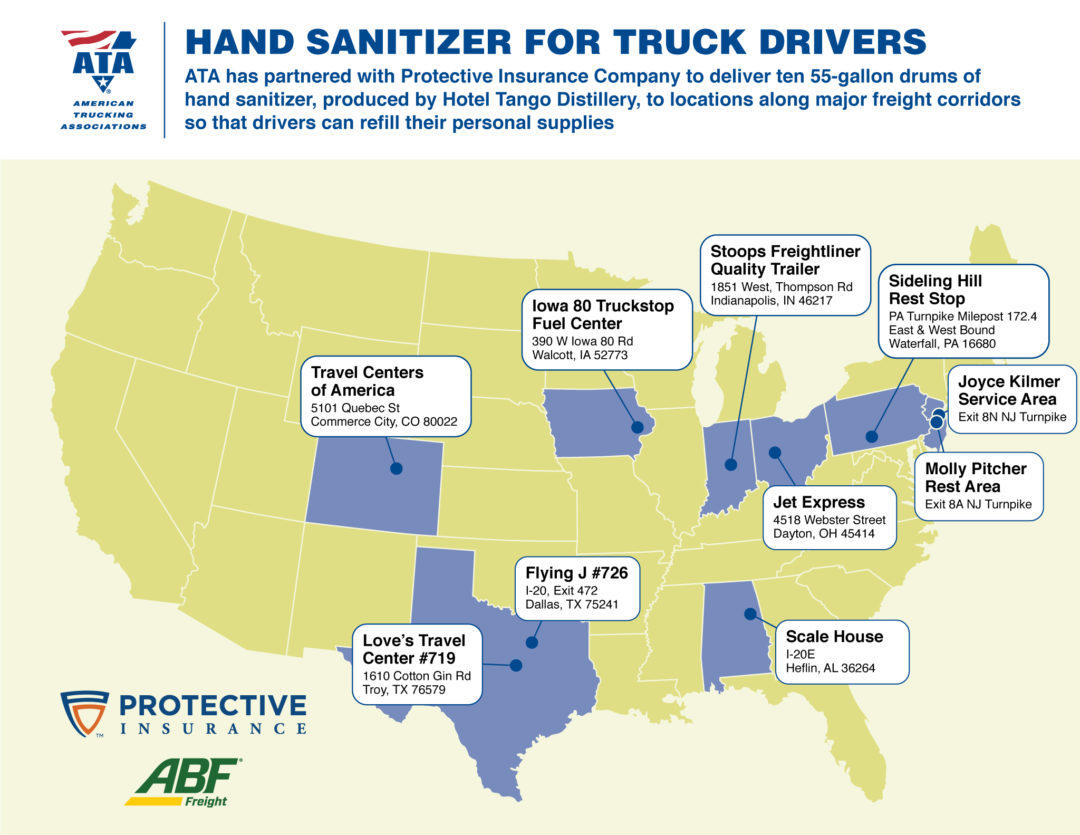ATA builds on front-line worker initiative—Covid-19 roundup, May 12
Program provides hand sanitizer, meals for truckers; plus news from DHL Global Forwarding, LocatorX, Prologis, and more.

The American Trucking Associations (ATA) is joining with corporate partners to further its #thankatrucker campaign, launching its “Providing for the Frontlines” initiative this month.
Insurance firm OneBeacon along with U.S. Bank, Michelin, and Hydro-Chem Systems are joining with ATA to provide hand sanitizer nationwide as well as meals for professional truck drivers on the road, the groups said this week.
“This new initiative aims to celebrate unsung heroes in the trucking industry who continue to bravely deliver America’s goods throughout the ongoing coronavirus pandemic, as well as provide relief to the hard-working men and women behind the wheel,” Arlington, Va.-based ATA said in a statement Monday.
The initiative will include a photo contest in which drivers can submit a “fun photo” of themselves and their rig. Once submitted, they will automatically be entered into a drawing to win a $25 electronic gift card for a meal of their choice while on the road. Multiple winners will be selected daily. Truckers can enter and anyone can view the daily winners at www.trucking.org/thankatrucker.
Providing for the Frontlines builds on ATA’s efforts to support truckers nationwide. Earlier this month, the association teamed up with Protective Insurance and ABF Freight to supply 550 gallons of hand sanitizer to eight states across the country. To date, thousands of drivers have been able to refill their personal supply at no cost to them, ATA said.
Other efforts to support the Covid-19 fight include:
- DHL Global Forwarding is partnering with customers in the healthcare industry to ship more than 100 tons per week of medical supplies, equipment parts, pharmaceuticals, and protective clothing for hospitals, healthcare workers, and patients throughout the United States and is also offering special charters to and from China to ease the capacity crunch for customers, officials said. “As a globally operating company, epidemic and pandemic risk scenarios are an integral part of the group's continuous risk planning, and our operations are being continuously adapted to mitigate potential impacts to our customers,” according to David Goldberg, CEO of DHL Global Forwarding, U.S. “I am personally committed to prioritizing any medicine or aid shipments in and out of the U.S. during these challenging times.”
- Royal Bay, a joint venture between packaging and design companies Bay Cities and The Royal Group, is assembling and packaging 2 million face shields for essential workers. The shields will be distributed to medical suppliers and distributors who will send them to medical facilities and hospitals nationwide. At capacity, Royal Bay will assemble and package 500,000 units per week, the companies said.
- Atlanta-based tracking technology firm LocatorX has launched a National Medical Device Registry allowing hospitals to log their life-saving equipment at no cost during the Covid-19 crisis. The registry will also help hospitals quickly and easily identify the status of ventilators available for loan, the company said. “For several weeks, there have been calls for technology companies to help in the Covid-19 crisis and we have recognized the need to step in and offer our service and technology,” company Chairman Jim Joustra said. LocatorX technology enables organizations to track and find their assets, while monitoring the status and movement of the assets throughout their service life.
- Bryn Mawr, Pa.-based human resources technology firm Aliro said May 5 it is offering its talent-matching services free for 90 days to help with the Covid-19 pandemic. The program is designed to help employees displaced by mandated business closures find “new opportunities in growing fields.” “While some industries, like hospitality and entertainment, are shedding jobs, others, including health care and logistics, must quickly scale up to provide essential services,” the company said. “Aliro's proprietary talent-matching system is perfectly positioned to help match prospective employees to essential businesses, helping to mitigate the economic fallout from the pandemic.”
- Logistics real estate firm Prologis is taking steps to fight the pandemic as well. The company’s Prologis Foundation has launched a $5 million global relief fund to provide financial support to nonprofits and community-based organizations on the frontlines of the response. Feeding America and the European Food Bank Federation are the first partners in the effort, and the Foundation’s gift will fund 8.5 million meals for people in need across the United States and Europe, the firm said. Other recipients of the fund include the American Red Cross, European Red Cross, Community Foodbank of New Jersey, NJ Pandemic Relief Fund, and City Harvest in New York. In addition, Prologis has also launched “Space for Good,” a program that offers unoccupied buildings for Covid-19 relief efforts. To date, Prologis has donated more than 1-million square feet in 11 markets and $4.4 million in in-kind rent to local, state, and federal agencies in the United States, and to hospitals and relief organizations around the world.
To see further coverage of the coronavirus crisis and how it's affecting the logistics industry, check out our Covid-19 landing page. And click here for our compilation of virus-focused websites and resource pagesfrom around the supply chain sector.
Related Articles
Copyright ©2024. All Rights ReservedDesign, CMS, Hosting & Web Development :: ePublishing